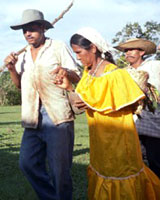Conference on freedom of expression organized in Bolivia
31-12-2010 (Quito)

Bolivian indigenous community
© UNESCO
The Bolivian Press Association (Asociación Nacional de la Prensa, ANP), in collaboration with UNESCO’s Office in Quito, organized a conference under the theme “International Legal Standards on Press Freedom and Freedom of Expression” in La Paz on 17 December 2010. Attended by 75 participants, the Conference presented the results of a study of the current Bolivian legal framework.
The analysis, conducted by the Uruguayan expert, Edison Lanza, particularly focused on the recently-approved Bolivian Law against Racism and Discrimination. According to the study’s conclusions, this Law is a result of the legislators’ clear goodwill to avoid racism and discrimination in a country, where indigenous cultures were marginalized in the past. It also aims at promoting conditions of equality among all people living in Bolivia.
However, the current formulation of the Law articles may affect other fundamental rights, such as freedom of expression and information, reveals the study, which submits the Bolivian Law to the "tripartite test" of the Inter-American Court of Human Rights (IACHR). This test is based on three requirements - legality, legitimacy and necessity - and aims to verify if limitations to freedom of expression are admissible and non-abusive, according to the IACHR and international standards.
The conference in La Paz was widely covered by Bolivian media and its conclusions should contribute in a significant and constructive way to the current debate in the country on how to fight against racism while protecting freedom of expression. The event was organized within the framework of the International Programme for the Development of Communication (IPDC) project, Bolivia: Access to Information.
The study, in Spanish, is available in the PDF file below.
However, the current formulation of the Law articles may affect other fundamental rights, such as freedom of expression and information, reveals the study, which submits the Bolivian Law to the "tripartite test" of the Inter-American Court of Human Rights (IACHR). This test is based on three requirements - legality, legitimacy and necessity - and aims to verify if limitations to freedom of expression are admissible and non-abusive, according to the IACHR and international standards.
The conference in La Paz was widely covered by Bolivian media and its conclusions should contribute in a significant and constructive way to the current debate in the country on how to fight against racism while protecting freedom of expression. The event was organized within the framework of the International Programme for the Development of Communication (IPDC) project, Bolivia: Access to Information.
The study, in Spanish, is available in the PDF file below.
Related themes/countries
· Bolivia
· Press Freedom
· Freedom of Expression
· International Programme for the Development of Communication (IPDC)
· Weekly newsletter
Share this story:
Contact information
- UNESCO
Source
- UNESCO Office in Quito (in Spanish)
Field office














